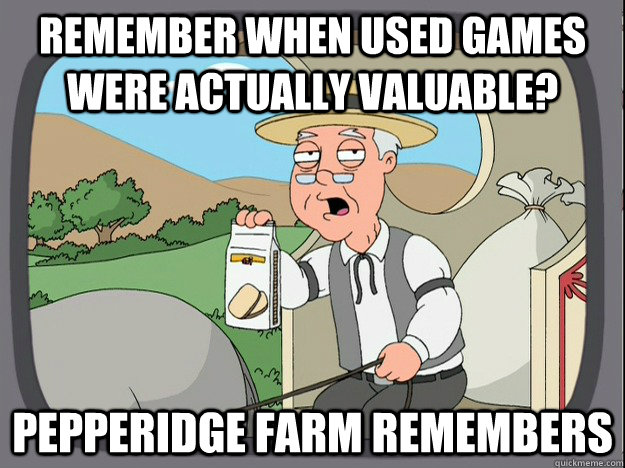Start by typing in the artist:

If there has been one seriously hot topic in gaming in the last year it would be how people feel about used games and DRM. Long story short, people hate DRM because it's the devil and it wants to steal all of your hard earned money. Now, you might be thinking because I say that, this post is about DRM, but it isn't. In this week's article I want to talk to you about the evolution and current state of used games.
Now to give you a little bit of background on where I'm coming from lets start with this: I'm a 27 year old gamer who has been playing for 23 years. I've seen the rivalry between Nintendo and Sega, the next generation of gaming, the mid-2000 console wars, and I will live to see the day where they release a holodeck for your home. With that said, I've seen the used game market grow from that cute puppy who lives on your street to the hulking monster who wants to shank you in a dark alleyway and steal your money because Fuck You that's why. I am absolutely disgusted with the way we stand right now in the used games market. To explain to you why I believe we should go back a little bit however.
I remember the Christmas of 1991 better than just about anything because it was the Christmas when I recieved a Super Nintendo and a Sega Genesis. Don't be too jealous, my parents were divorced but hooray for two Christmases due to unforseen childhood tramua! Anyway, it was the Christmas that turned me into a gamer. Now something a lot of people may not realize is that back in the cartridge days, video games were pretty expensive. I can already hear you thinking to yourself "Video games are expensive now." to which I will give you a light guffaw and kindly explain that the average cost of a SNES game in the 90s was between 60 and 80 USD unlike the price points of now where you can go online and pick up a discount on day one. Because the cost of video games were so high back in the day I would normally get around 4 to 5 games PER YEAR. Because I didn't want to base this entire article on my own experiences I asked my friends and found that, for the most part, the number was the same for them as well.
During this point in the evolution of gaming there were tons of games that were being released and no one wants to get stuck with a bad game. I found that kids at that point in time, due to the limited amount of games we could access per year and what was actually available, got big on game swapping or game trading. The idea of game trading now compared to back then boggles my mind because then we were trading games for direct face value. To us it didn't matter if there was a difference in the games because we just wanted that new fresh experience. I don't recall ever trading a game with a friend and still having to give them five bucks to seal the deal. Which got me thinking about another issue that we will get to in just a bit. Besides, the only place you could really trade games at that point was at pawn shops and you'd be lucky to make a few dollars.
If we hit fast forward to the lifespan of the Nintendo 64 and the Playstation there seemed to be a serious economic boom related to gaming as it started to become a more socially accepted form of entertainment. You would find all sorts of used stores carrying video games and it also brought along specialty gaming businesses like Babbages and Electronic Boutique who would gladly accept your used games for value on trade-ins. I assure you, the idea of this blew my tiny mind. I can remember taking in plenty of games over the years up to and even surpassing the release of the PS2 and the XBOX...but then something happened.
Competition stops when there is no longer competition to be had. Babbages became GameStop and began to buy up and merge (see:Gnaw them up and eat them) with virtually almost all it's specialty competitors like EB, FuncoLand, Gamesworld, and Micromania. If you'll notice this happened about the same time the Xbox 360 and the PS3 were released. This is also the same time a lot of people started noticing a trend in used games. What was that trend? We were getting screwed and there wasn't a damn thing we could do about it. Game that would have normally traded in for twenty dollars a generation ago were getting five measly bucks for trade now. Used copies of games were just barely cheaper than their brand new couterparts were. If we're going to a store to make game trade ins, clearly we are looking to save more than the five dollar difference in copy you're offering us, are we not?
Now I understand that times change and with the evolution of gaming we saw the evolution of a business model too, but should this business model not find a fine line between profit margin and customer satisfaction? Is it not bad enough that we have to sit through what might as well be Youtube video ads every time we try to give you money in exchange for a product? If you don't know what I'm talking about go into a GameStop and try to buy something without hearing the "Would you like to pre-order insert game name here" list. Because chances are the only thing you're going to want to pre-order by the time it's done is the sweet, sweet release of death that you would have taken over the absolute waste of ten minutes you could have saved by going to Walmart. Do you want to know the kind of profit they're making right now? Because I have those numbers right here:
For fiscal year 2012, total global sales were $8.89 billion, a 7.0% decrease compared to $9.55 billion in fiscal 2011. Here's the source for haters who think I'm talking out my ass most of the time. So can someone please explain to me why a company making around 50% of their profit off the used games market, can't cut into that a little bit and offer us good prices on newer used games the way that online distributers do? For the record I'm not even talking about Steam or downloadable content, Amazon has awesome sales on the physical copies of the game almost immediately and now with their trade in program you can buy used copies for cheaper there as well! I'm sure GameStop has bills, don't get me wrong, but how much can your labor costs be when you're paying your employees barely over minimum wage? They are not even scheduling them full 40 hour a week schedules, while the managers are breaking their back for intro salary hocking these games during their 60+ hour work weeks. A lot of people don't buy clothes because of slave labor in other countries, might want to take a little closer of a look at what is happening in the mall two miles down from your house people.
So why are the games we're bringing in almost worthless for trade credit? Are there not enough man hours put into them? Not enough replayability? Are the graphics not good enough? I understand that the trade system is based on the demand they are recieving because no one wants a warehouse full of games they can't sell but I still think the idea of offering someone fifty cents for a game that isn't even a year old is absurd. Gamers want to play used games but we also don't want you giving us three bucks for something you're going to sell for 35. We want to trade in games with you but you're making it really hard. I hear people complain that they don't feel they should have to pay for Xbox Live to play online, well I don't feel I should have to pay for a GameStop PowerUp Pro account just to get somewhere close to the value of a game I'm trading in.
I'll end this article by saying this, it is rare that I buy used games any more or trade in games (partly due to the price issue). Someone the other day told me I was being selfish by thinking that the used game market should die off. I thought about that for a long time and I remember at a time where I sold my SNES and a backpack full of games for about 80 bucks so I could buy a copy of The Ocarina of Time for my Nintendo 64. Although that game was a good game and very entertaining, when I was done with it all I really wanted was my SNES and games back. I think that feeling is how a lot of current gen gamers and kids feel when they are purchasing games with their trade in value. They have to watch 20 games fly out the door that they can't get back for just the purchase price of a new game. It makes me sad that we have reached a point where video games are so heavily consumed by the mass market and populus, not because I don't love gaming, but because I do love gaming. I love the principal of fair trade too. If you agree with anything I've said in this article make sure to drop by and support your local gamestore if you have one because chances are they'll always give you a better deal than a big chain will. Trade in your games wisely and game on.
TL;DR - GameStop needs to stop being jerks without competition and forcing bad trade in values and prices of used games on us.





